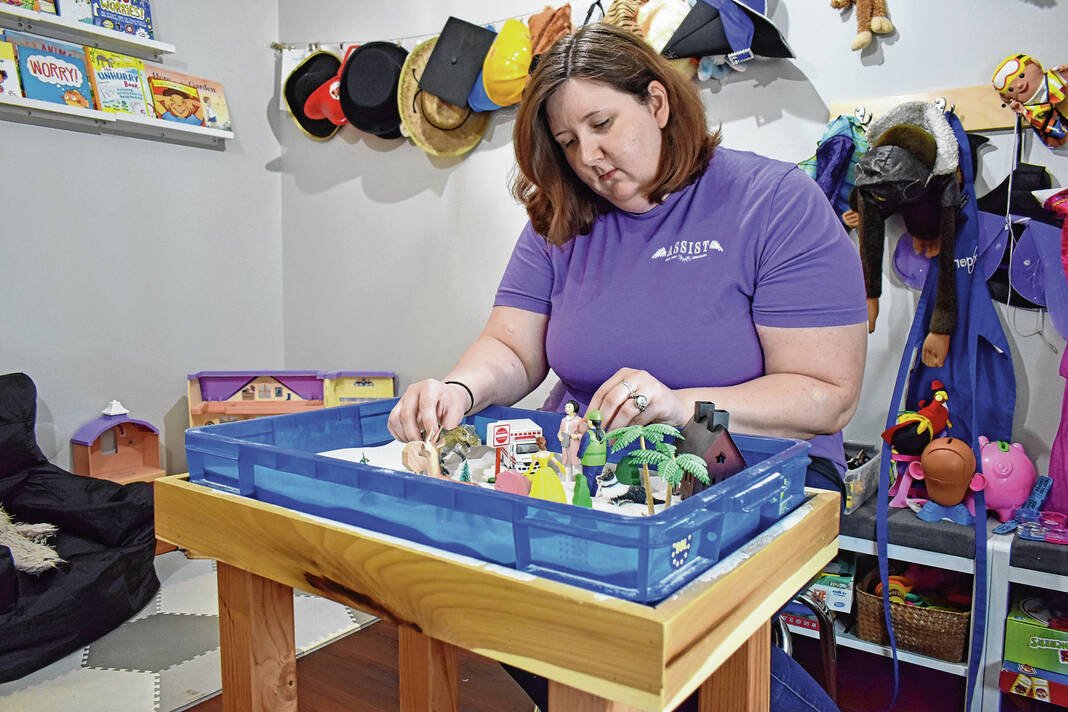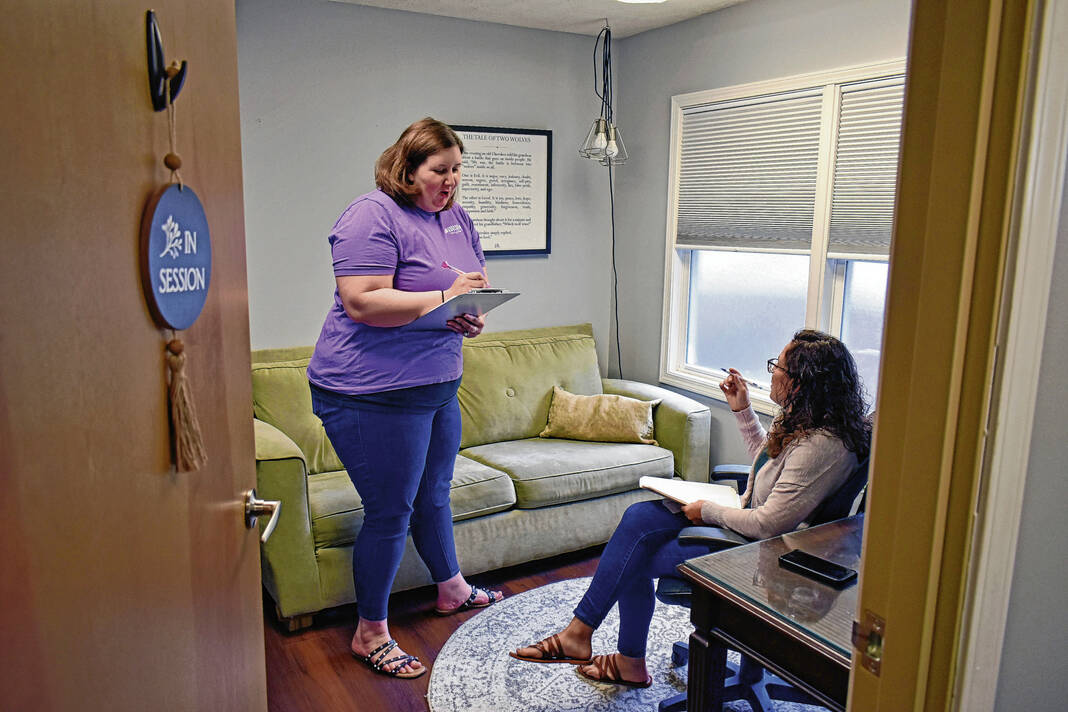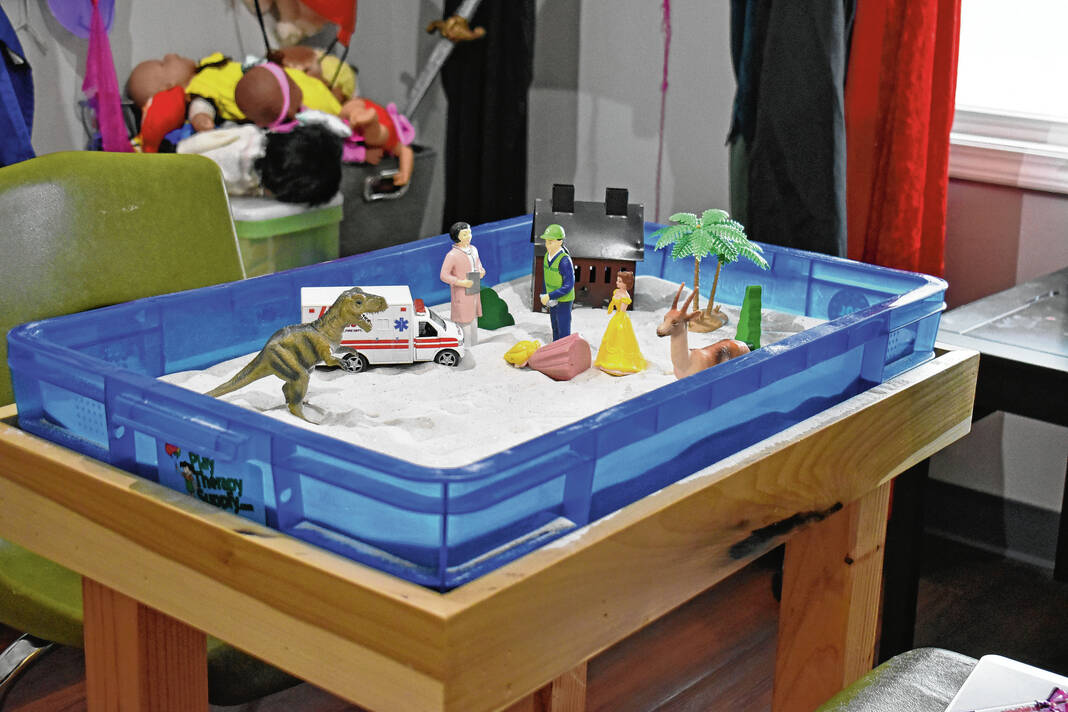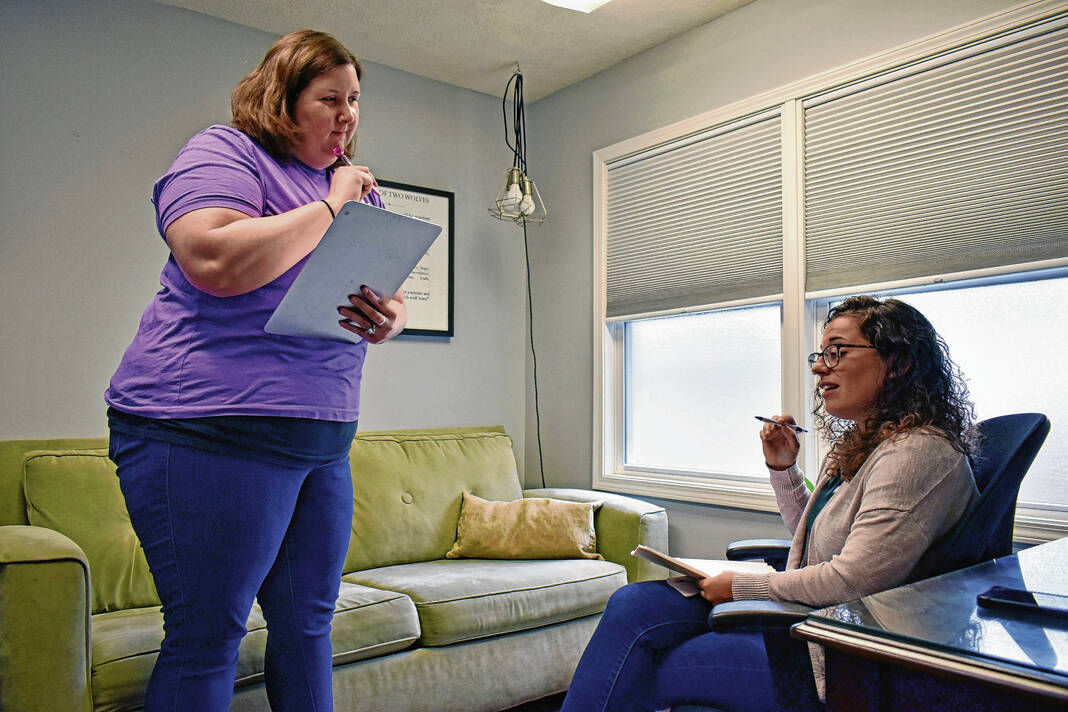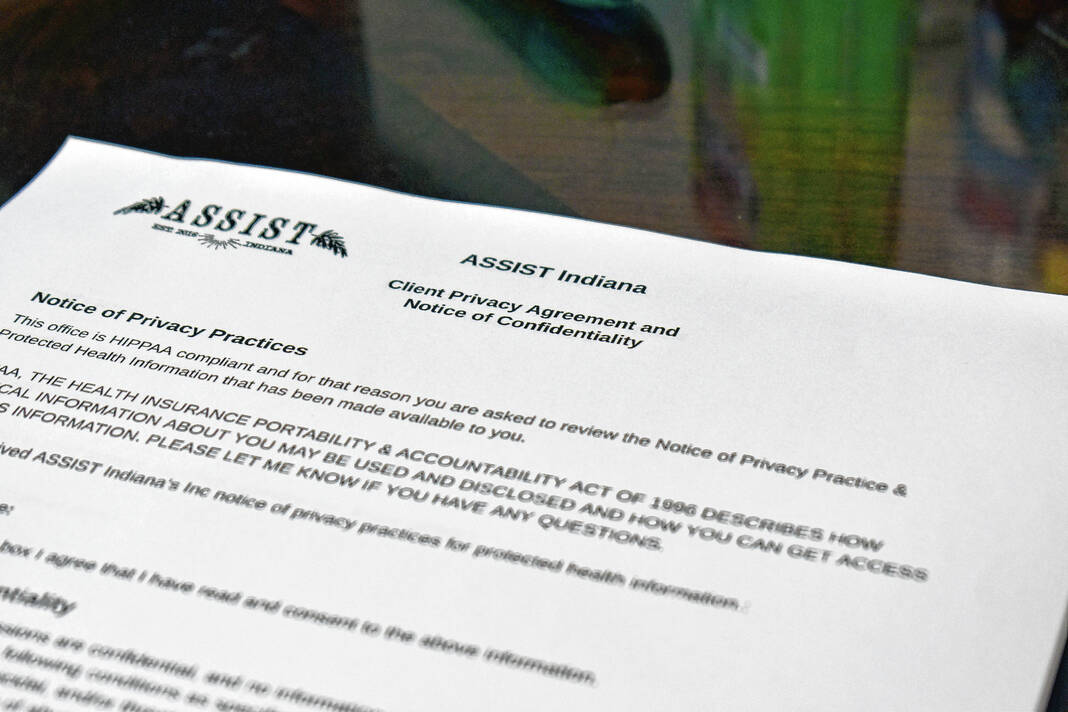Oftentimes, it’s very difficult for the survivors to talk about sexual abuse.
And many times the abuse is never reported to the police.
Every 68 seconds in the United States, a person is sexually assaulted. Every 9 minutes, the person is a child, according to RAINN, the nation’s largest anti-sexual violence organization.
There are many challenges to reporting sexual abuse, including re-traumatizing survivors and their fears of not being believed. While abuse may not always be reported to police, many survivors still seek therapy, experts at Franklin-based ASSIST Indiana say.
ASSIST has been at the forefront of tackling sexual, domestic and other violence since it was founded in 2016. The organization provides free trauma therapy, support groups and community resource referrals, as well as crisis intervention, victim advocacy, case management and prevention education. They are also the local rape crisis center for Johnson and surrounding counties.
Since ASSIST was established, they have had over 6,000 referrals, which includes both people inquiring or engaging their services. So far this year, they have had over 230 referrals.
Many challenges
Survivors face many challenges in the aftermath of the abuse. Questions about whether they should report the abuse are often one of those challenges.
“They might be scared of the perpetrator. A lot more often than not, the person knows the person and has had previous relationships: it’s a friend, it’s somebody close to them or their family. So they don’t want to tell people because they don’t think that they’ll be believed,” said Jill Gonterman, a trauma counselor for ASSIST.
Talking about what happened also can cause their body to re-experience the trauma — an emotionally draining experience, Gonterman said.
Though investigators try to not ask questions that blame the victim, when alcohol is involved questions are asked about how much they drank. The victim is usually aware of the negative public perception in situations involving alcohol, so they may be hesitant to speak about what happened, she said.
They may also blame themselves for what happened or fear others will blame them. That can silence them and cause them to downplay their trauma, she said.
“Nobody wants to have such a traumatic experience happen and then have someone say, ‘But what did you do to cause that?’ or ‘Maybe some of this was your fault?’” Gonterman said.
Many survivors are ashamed or embarrassed. Other times, survivors may not trust the police or might believe the legal system won’t work for them. Female survivors may also be uncomfortable about speaking about what happened with male officers, she said.
Going through a four to six-hour forensic exam at a hospital can be difficult for victims as well, Gonterman said.
“It’s lots of questions and pictures and they have the option to do a lot of different things within that forensic exam, but it’s also just a lot of a lot of stuff to go through,” she said.
With all of the steps involved and fears considered, many abuse survivors opt to go through therapy instead, Gonterman said.
Where ASSIST comes in
The staff at ASSIST often get involved in these cases after receiving calls from local law enforcement and Centers for Hope — programs offered at nearby hospitals such as Community Health and Franciscan Health that provide care and resources for victims of abuse or violence.
“We will come and respond and sit with them through it, provide the support, help them navigate through that and filing a police report if they want,” Gonterman said. “Police officers will also refer victims to us because they know how important the support and the therapy is afterward.”
However, they also receive calls and messages from survivors themselves, including walk-ins. The nonprofit works with survivors regardless of whether a police report is filed, she said.
The Johnson County Prosecutor’s Office sends ASSIST referrals as well The office has an advocate who works with all sex crime victims and handles educating the victim about the legal process, Gonterman said.
The staff at ASSIST can see survivors at any point during the judicial process, from before charges are filed to right before a trial.
“Everybody’s healing journey is different,” Gonterman said. “The nice thing about our grant funders is that they allow us to just meet the victim where they are and treat them how they need to be treated.”
If charges are pursued and filed, the process can be lengthy and difficult for victims. But ASSIST and the JCPO work well together throughout the process to support them, she said.
ASSIST is behind the scenes helping the victim learn coping skills, starting the process, prepping them for court, and helping build a good mental health foundation to build off of if they do have to go to court, she said.
Increased awareness
Awareness of sexual abuse has been increasing over the last decade, which could be behind the increase in reporting rates.
Especially since the coronavirus pandemic, ASSIST has been seeing more and more survivors. They’ve also seen more people who are older coming forward to talk about trauma that happened in their past, Gonterman said.
“They’re seeing how it’s impacting their life negatively and they want to address it,” she said.
There has been more news coverage of sexual assault and harassment over the last decade, people also seem to feel more comfortable talking about it and seeking help for abuse. More people are also more open to believing victims, Gonterman said.
ASSIST has also seen an increase since they began doing abuse prevention education programs at schools. The curriculum goes from kindergarten to 12th grade and is designed to be age-appropriate. By teaching children the signs of sexual abuse and what to do, they are learning it’s OK to get help, said Tracy McQueen, victim advocate.
Along with being a victim advocate, McQueen also does outreach and prevention education for ASSIST. Through her role, McQueen builds community partnerships and works with schools for training and curriculum.
Youth education
ASSIST’s goal is to help other organizations with make sure every student in Indiana has had some form of prevention education for abuse. ASSIST has been able to hold programs in four counties — including Johnson County, McQueen said.
Locally, Indian Creek, Franklin and Greenwood schools have called in ASSIST to educate students. Clark-Pleasant schools have used ASSIST in the past, but moved the program in-house, she said.
“That’s the goal: we get in and they see the importance of it that they will take it on themselves,” McQueen said.
ASSIST will be coaching mental health counselors at Franklin schools this year on how to report abuse and how to talk to children with trauma, McQueen said.
ASSIST curriculum for schools covers reporting, red flags, signs of abuse, boundaries, online safety and peer-to-peer abuse. The students also learn about commonalities of abuse, such as that abusers are usually someone known to the victim, she said.
Other parts of the curriculum teach students how to recognize and evade words that are commonly used to groom and abuse victims. The curriculum also emphasizes that crimes like bullying, harassment, and sexual abuse are illegal, she said.
“Kids don’t know what they don’t know until they’re taught sometimes,” McQueen said. “They learn that those behaviors don’t have to be tolerated or kept secret because they have a right to be free of abuse.”
McQueen also teaches students about the concept of trusted adults. There should always be two trusted adults in a child’s life, one outside and one inside the home, so they can talk to about behaviors that make them feel unsafe, she said.
Oftentimes, children are threatened not to tell anyone about the abuse and are told it is their fault, she said.
“It’s the fault of the person that is doing it, not the person that it’s happening to. The offender is solely responsible,” she said.
ASSIST does pre- and post-testing for the education classes. The scores are going up every year, which shows kids are retaining the knowledge, she said.
Preventing abuse
Kids are given the knowledge to know the signs of abuse of what to do if it’s happening to them, including online. This is important, McQueen said.
“If you get prevention education out there, you get preventative services in place, kids are getting the knowledge that they need to keep themselves safe,” she said.
Online safety is especially key right now, as online incidents can evolve into long-term sexual abuse. By giving students the knowledge about the dangers and what to do, they can keep themselves safe, McQueen said.
In 2020, the National Center for Missing and Exploited Children, or NCMEC reported 21 million files of child sex abuse materials were disseminated online. Last year, that number was up to 32 million — and will likely continue to go up, McQueen said.
“The nature of that crime has no demographic,” she said. “It stems everything from the dark web to suburban neighborhoods, to the upper echelons of our society.”
McQueen talks about this with students as well, which encourages them to think about, prevent and/or report crimes, bullying and harassment.
There are many resources available online for people to learn more about preventing abuse. McQueen usually stresses that parents should know what their children are doing on social media, just as much as what they are doing when they go out with friends.
Children may make mistakes, parents should know that’s part of education too. It is important to have an open relationship with children so that when something does happen, the child knows they can talk to their parents about it.
Just having people around who know how to respond to news of abuse can make all the difference for survivors.
“Knowing the resources and phrases that can be helpful to say, or just being okay with listening, that’s huge and makes a big difference to survivors,” she said.
BY THE NUMBERS
ASSIST Indiana referral numbers
2016-2019: 1,500*
2020: 436
2021: 588
2022: 306**
2023 (to date): 230
* Year-specific data was unavailable for this period.
** Referrals were lower as ASSIST was down one of their part-time therapists and was on-boarding a third victim advocate.
Source: ASSIST Indiana
SEXUAL ASSAULT AND ABUSE RESOURCES
24-hour crisis intervention is available at ASSIST Indiana by calling their main number, 317-739-4456. Walk-ins are also welcome from 9-11 a.m. and 1-5 p.m. Monday through Thursday. Friday is appointment only.
ASSIST Indiana is located at 198 E. Jefferson St., Franklin.
For a complete list of resources from the Indiana Coalition to End Sexual Assault and Human Trafficking, visit icesaht.org/get-help/.
For emergency help dealing with sexual assault call or text 911 to report the crime.


